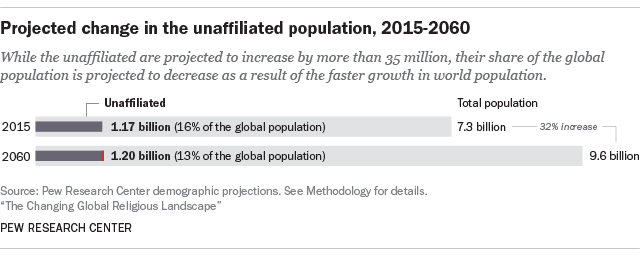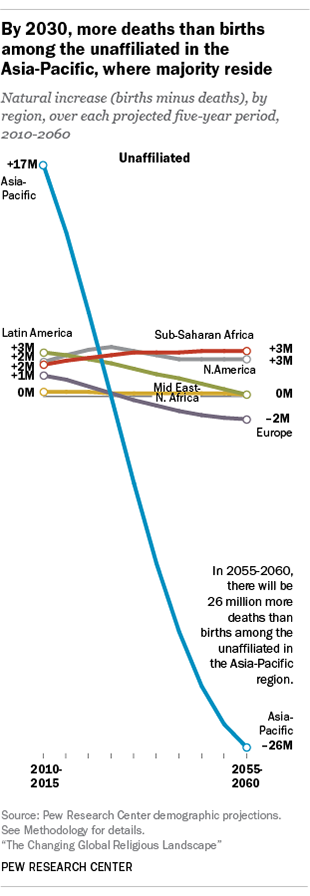For years, the percentage of Americans who do not identify with any religion has been rising, a trend similar to what has been happening in much of Europe (including the United Kingdom). Despite this, in coming decades, the global share of religiously unaffiliated people is actually expected to fall, according to Pew Research Center’s new study on the future of world religions.

To be clear, the total number of religiously unaffiliated people (which includes atheists, agnostics and those who do not identify with any religion in particular) is expected to rise in absolute terms, from 1.17 billion in 2015 to 1.20 billion in 2060. But this growth is projected to occur at the same time that other religious groups – and the global population overall – are growing even faster.
These projections, which take into account demographic factors such as fertility, age composition and life expectancy, forecast that people with no religion will make up about 13% of the world’s population in 2060, down from roughly 16% as of 2015.
This relative decline is largely attributable to the fact that religious “nones” are, on average, older and have fewer children than people who are affiliated with a religion. In 2015, for instance, the median age of people who belong to any of the world’s religions was 29, compared with 36 among the unaffiliated. And between 2010 and 2015, adherents of religions are estimated to have given birth to an average of 2.45 children per woman, compared with an average of 1.65 children among the unaffiliated.

Between 2010 and 2015, there were a larger estimated number of births than deaths among religious “nones” in all regions, led by the Asia-Pacific region, which is home to a majority of the global religiously unaffiliated population. But this will change in the coming years. For people with no religion in Asia, for instance, the number of deaths will begin to exceed the number of births to unaffiliated mothers by 2030, a change driven by low fertility and a relatively old unaffiliated population in China, where over 60% of the world’s unaffiliated population currently resides. By 2035, unaffiliated deaths in Europe are expected to outnumber births there as well.
In projecting the relative decline of the unaffiliated we also factored in religious switching, or conversion, for the 70 countries with reliable switching data. Religious switching has been powering the rise of the “nones” in the United States and Europe, and a net gain globally of nearly 70 million people are projected to join the ranks of the unaffiliated through religious switching between 2015 and 2060. But at the global level, gains made through religious switching are overshadowed by the impact of fertility and mortality.
Some social theorists have suggested that as countries develop economically, more of their residents will move away from religious affiliation, as has been seen in Europe. But there is little evidence of such a phenomenon in Muslim-majority countries. Moreover, in Hindu-majority India, religious affiliation is still nearly universal despite rapid economic and social change.
China, with its large population and lack of reliable data on religious switching, is a wild card in our analysis. This is especially true for the religiously unaffiliated population because more than 700 million people of the 1.17 billion who do not identify with any religion live in China.
Some experts believe the Christian population in China is rising while the religiously unaffiliated population is falling. If this is true – and the trend continues – religious “nones” could decline as a share of the world’s population even more than the Pew Research Center study projects.
This is an update of a post originally published on April 3, 2015.
Note: For more details on the religiously unaffiliated and their place in these projections, see “The future size of religiously affiliated and unaffiliated populations,” an article by researchers involved in this study, published in the peer-reviewed journal Demographic Research.
